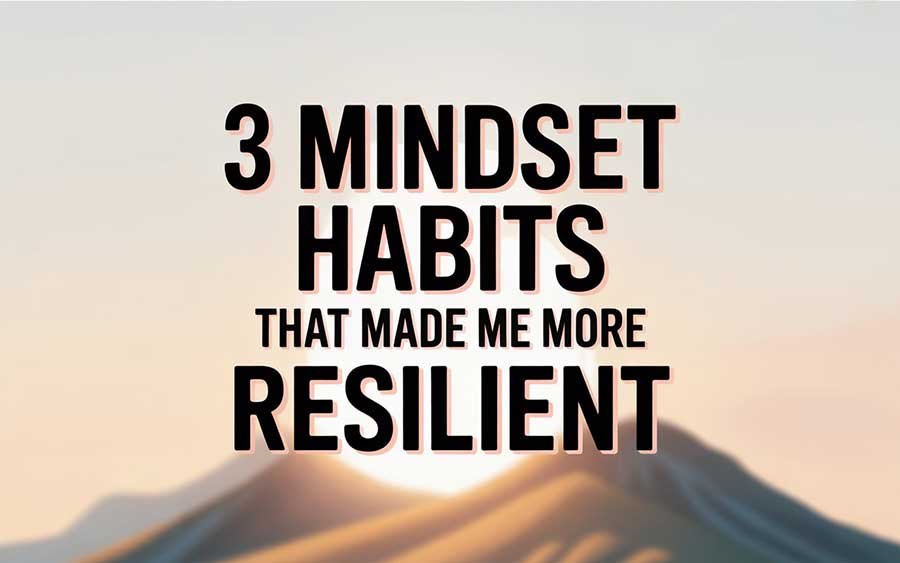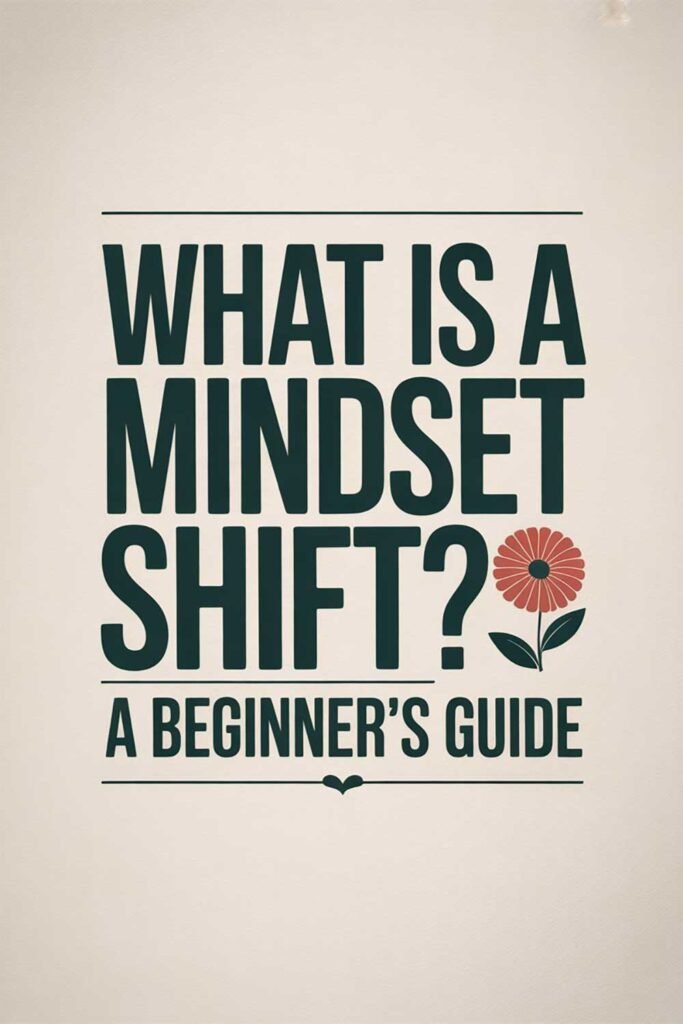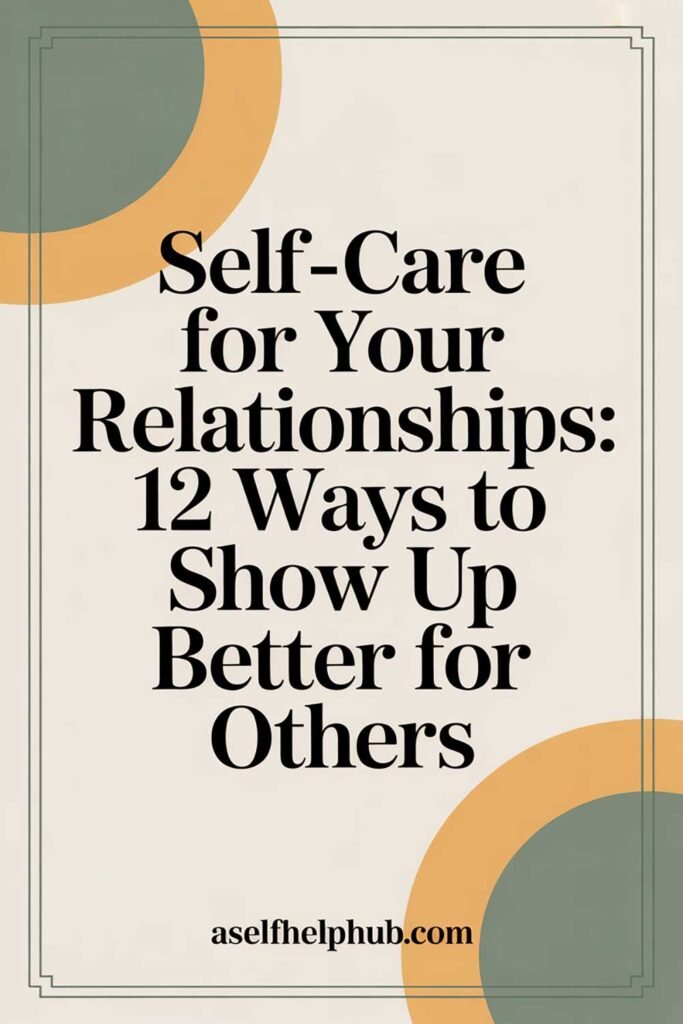
3 Mindset Habits That Made Me Unstoppable: Your Blueprint for Unshakeable Resilience
Life, as they say, happens. And often, it happens with a surprising, sometimes brutal, force. Whether it’s a sudden career setback, a personal loss, an unexpected financial challenge, or just the relentless grind of daily pressures, we all face moments that threaten to overwhelm us. For a long time, my default reaction to adversity was to crumble. A minor hiccup could derail my entire day, and a significant setback could send me spiraling into self-doubt and despair. I admired people who seemed to bounce back quickly, effortlessly navigating life’s storms, and wondered if I was simply “not built” to be resilient.

This feeling of fragility was exhausting. It kept me from taking risks, made me dread change, and constantly left me feeling at the mercy of external circumstances. I wanted to be that person who could face challenges head-on, learn from them, and emerge stronger, but I just didn’t know how.
The good news? Resilience isn’t a genetic lottery. It’s a muscle. And like any muscle, it can be developed, strengthened, and refined through consistent practice. My journey from easily defeated to surprisingly resilient wasn’t about developing superhuman strength; it was about cultivating specific mindset habits – subtle, yet profound, shifts in how I perceived and responded to life’s inevitable curveballs. These habits, once integrated into my daily routine, began to rewire my brain, transforming my reactions from despair to determination.
This isn’t about ignoring pain or pretending everything is fine. It’s about developing the internal fortitude to process challenges, learn from them, and move forward with purpose. If you’re tired of feeling knocked down by life, stick with me. I’m going to share the three powerful mindset habits that fundamentally increased my resilience, offer real-life examples of their impact, and show you how you can begin cultivating your own unshakeable inner strength.
Why Building Resilience is Your Ultimate Superpower
In a world that feels increasingly uncertain and complex, resilience is not just a desirable trait; it’s an essential survival skill. Here’s why cultivating it matters more than ever:
- Navigates Uncertainty with Confidence: Resilient individuals are better equipped to handle ambiguity and change without succumbing to paralyzing anxiety.
- Faster Recovery from Setbacks: Instead of dwelling on failures, resilient people learn from them and adapt quickly, reducing downtime and emotional distress.
- Stronger Mental Health: The ability to cope effectively with stress and adversity protects against burnout, depression, and anxiety.
- Enhanced Problem-Solving: Resilient minds tend to view challenges as solvable problems rather than insurmountable obstacles, fostering creative solutions.
- Greater Fulfillment: Overcoming difficulties and learning from them builds a profound sense of self-efficacy and accomplishment.
- Unlocks Potential: Fear of failure often holds us back. Resilience empowers us to take calculated risks and pursue ambitious goals.
Ultimately, resilience isn’t about avoiding hardship; it’s about learning to dance in the rain, knowing you have the inner strength to weather any storm.
My 3 Mindset Habits That Forged My Resilience
These habits aren’t grand gestures; they are subtle, consistent internal shifts that, when practiced daily, create a powerful ripple effect.
1. The “What Can I Learn?” Lens: Reframing Failure as Feedback
This was perhaps the most challenging, yet most impactful, shift. My natural inclination was to view mistakes or setbacks as personal failures, proof of my inadequacy. This mindset led to self-criticism, shame, and a fear of trying again. I had to consciously retrain my brain to see every “failure” not as an end, but as a crucial piece of information – a lesson.
How it built resilience:
- Removes Blame and Shame: When you view an outcome as “feedback” rather than “failure,” it detaches your self-worth from the result.
- Promotes Growth: This mindset encourages analysis and adaptation. Instead of asking “Why me?” you ask “What can I do differently next time?”
- Encourages Persistence: If every setback offers a lesson, then every attempt, regardless of the immediate outcome, contributes to your growth and eventual success. It transforms obstacles into stepping stones. This is a powerful shift, akin to understanding what a mindset shift is: a beginner’s guide.
Real-Life Example: When David, a software developer, received a harsh review on a project he’d poured months into, his immediate reaction was despair. He considered quitting. But then he remembered his “What Can I Learn?” habit. Instead of dwelling on the criticism as a personal attack, he meticulously went through each point, identifying specific areas for improvement in his code and communication. He scheduled a meeting with his lead, not to defend himself, but to ask clarifying questions and discuss how to implement the feedback. This proactive approach not only salvaged the project but also earned him respect for his maturity and willingness to learn. His next project was significantly stronger, and his confidence in his ability to improve soared.
2. The “This Too Shall Pass” Anchor: Embracing Impermanence
When I was in the throes of a difficult period, it often felt like it would last forever. This pervasive feeling of permanency amplified my stress and made recovery seem impossible. Cultivating the habit of reminding myself of impermanence became my mental anchor. It’s a simple, yet profound, acknowledgement that all things – good and bad – are temporary.
How it built resilience:
- Provides Perspective in Difficulty: When things are tough, remembering they won’t last forever offers a much-needed glimmer of hope and prevents despair from taking root.
- Promotes Gratitude in Good Times: It encourages you to fully appreciate positive moments, knowing they are also fleeting, which builds a deeper well of emotional reserves.
- Reduces Overwhelm: Knowing that the current state is not fixed allows you to break down overwhelming problems into manageable, temporary phases.
Real-Life Example: Maria, a small business owner, faced a devastating drop in sales during an economic downturn. Every day felt like an uphill battle, and she often felt overwhelmed by the thought of her business failing. She started writing “This too shall pass” on a sticky note above her desk and made it a point to repeat it whenever she felt the weight of her struggles. This simple mantra helped her detach from the immediate panic and focus on daily actions, reminding herself that the downturn was a phase, not a permanent state. This perspective allowed her to make strategic pivots and eventually navigate her business back to stability, rather than succumbing to the pressure. This also speaks to the importance of 10 smart money habits to build wealth over time, as financial resilience is a key component of overall resilience.
3. The “Focus on What I Control” Filter: Directing Energy Intentionally
One of the biggest drains on my resilience was constantly worrying about things outside my influence – other people’s opinions, market fluctuations, global events, unforeseen circumstances. This habit involves rigorously applying a mental filter: if I can’t control it, I acknowledge it, and then I consciously shift my focus to what I can control.
How it built resilience:
- Empowers Action: It shifts your mindset from victimhood (“Why is this happening to me?”) to agency (“What can I do about this?”).
- Reduces Anxiety: Much of our worry stems from attempting to control the uncontrollable. Releasing this burden frees up immense mental and emotional energy.
- Increases Effectiveness: By directing your energy towards actionable items, you become more productive and create tangible progress, which inherently builds confidence. This habit is fundamental to the 7 simple daily habits that changed my life.
Real-Life Example: Alex, a student struggling with intense anxiety about an upcoming, highly competitive exam, found himself paralyzed by worry about the difficulty of the test, how others would perform, and what the future held. He adopted the “Focus on What I Control” habit. He acknowledged his fear but then shifted his energy to what was within his power: his study schedule, his sleep, his nutrition, and his mindset during preparation. He stopped checking online forums filled with anxious peers and instead focused on mastering one concept at a time. This allowed him to channel his energy productively, reducing his anxiety and significantly improving his performance. This conscious redirection of energy is also reflected in the 7 daily habits that transformed my life by focusing on what truly matters.
Cultivating Your Own Resilient Mindset: Practical Application
These habits aren’t just theoretical; they require consistent effort. Here’s how to integrate them:
- Start Small: Pick one habit and focus on it for a week or two before adding another.
- Use Cues & Reminders: Sticky notes, phone alarms, or even a specific phrase you repeat can help trigger the habit.
- Journaling: After a setback or challenging day, use your journal to apply these lenses: “What did I learn from this?” “What part of this is temporary?” “What can I control right now?”
- Practice Self-Compassion: There will be days you revert to old patterns. Don’t beat yourself up. Acknowledge it, and gently re-engage with your habits.
- Celebrate Small Wins: Each time you successfully reframe a thought or shift your focus, acknowledge that progress. It reinforces the habit.
Picture This…
Imagine facing a significant challenge – a sudden job loss, a personal crisis, or an unexpected hurdle. Instead of spiraling into panic, you feel a quiet strength emerge. Your mind instinctively asks, “What can I learn from this?” You acknowledge the pain, but you also remind yourself, “This too shall pass.” And then, you calmly assess the situation, directing your energy precisely to “What can I control right now?” You begin to take small, deliberate steps forward, not driven by desperation, but by a deep-seated confidence in your ability to adapt, learn, and ultimately, overcome. You are not defined by what happens to you, but by how you choose to respond – and that, my friend, is the essence of unshakeable resilience.
20 Powerful Quotes on Resilience
- “The human spirit is indomitable.” – Unknown
- “Fall seven times, stand up eight.” – Japanese Proverb
- “It’s not what happens to you, but how you react to it that matters.” – Epictetus
- “Resilience is knowing that you are the only one who has the power and the responsibility to pick yourself up.” – Mary Holloway
- “I am not a product of my circumstances. I am a product of my decisions.” – Stephen Covey
- “Courage doesn’t always roar. Sometimes courage is the quiet voice at the end of the day saying, ‘I will try again tomorrow.'” – Mary Anne Radmacher
- “Adversity introduces a man to himself.” – Albert Einstein
- “You may have to fight a battle more than once to win it.” – Margaret Thatcher
- “The oak fought the wind and was broken, the willow bent when it must and survived.” – Robert Jordan
- “Failure is not the opposite of success; it’s part of success.” – Arianna Huffington
- “That which does not kill us makes us stronger.” – Friedrich Nietzsche
- “A diamond is a chunk of coal that did well under pressure.” – Unknown
- “Our greatest glory is not in never falling, but in rising every time we fall.” – Confucius
- “Resilience is accepting your new reality, even if it’s less good than the one you had before. You can fight it, you can do nothing but scream about what you’ve lost, or you can accept that and try to put together something that’s good.” – Elizabeth Edwards
- “The art of living lies less in eliminating our troubles than in growing with them.” – Bernard M. Baruch
- “No matter how bad things are, you can always make them worse. Or better. It’s up to you.” – Unknown
- “Do not judge me by my success, judge me by how many times I fell down and got back up again.” – Nelson Mandela
- “Grit is passion and perseverance for very long-term goals. Grit is having stamina. Grit is sticking with your future, day in, day out, not just for the week, not just for the month, but for years.” – Angela Duckworth
- “When we are no longer able to change a situation, we are challenged to change ourselves.” – Viktor Frankl
- “You are stronger than you think.” – Unknown
Disclaimer
Please be aware: This article is intended for general informational purposes only and is based on personal experiences, common self-help principles, and anecdotal evidence. It is not a substitute for professional psychological, medical, or psychiatric advice, diagnosis, or treatment. If you are struggling with chronic stress, trauma, depression, or anxiety, please consult with a qualified healthcare professional. Individual results from adopting these mindset habits may vary.
Share This Article!
Has this exploration of resilience sparked new hope or insights for you? Do you know someone who could benefit from cultivating a stronger inner game? Please share this article and help empower others to face life’s challenges with unshakeable strength!






